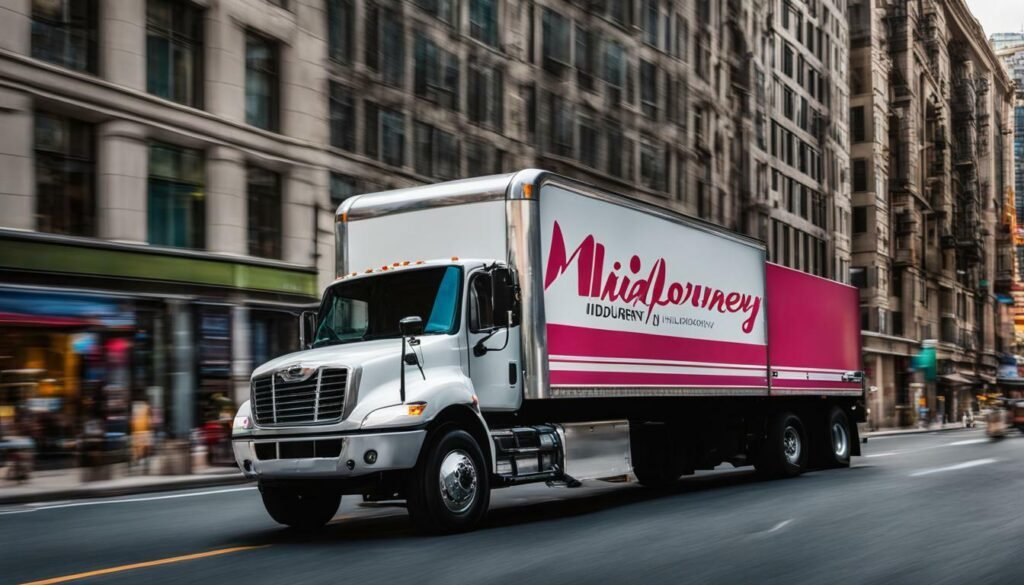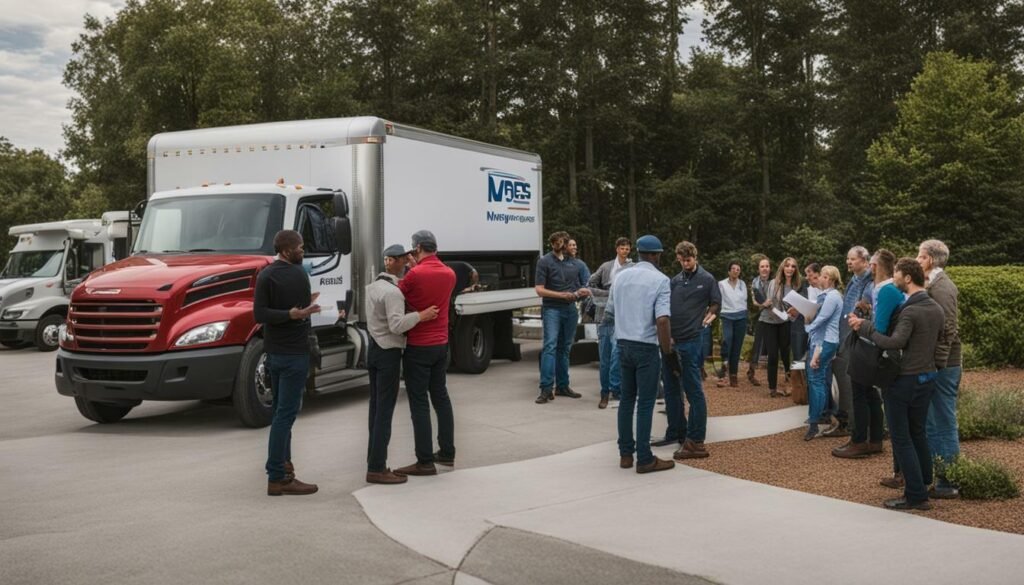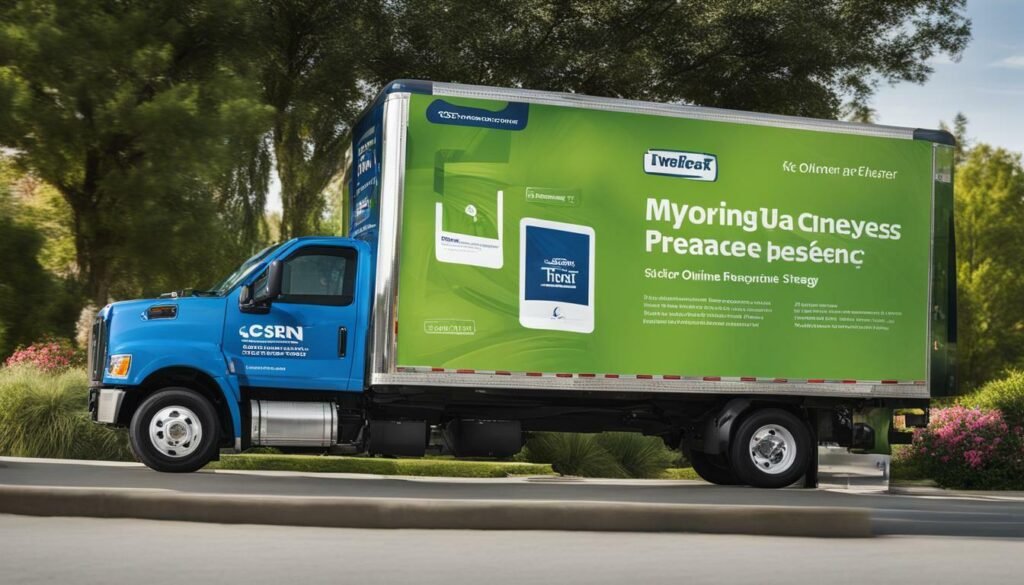Starting a moving company business requires careful planning and consideration. It is essential to understand the key steps involved in launching a successful moving business. From creating a strong business plan to establishing an online presence, each aspect plays a crucial role in your company’s growth and profitability.
To begin, you need to define your budget, goals, and what sets your moving company apart from the competition. This information will help you create a comprehensive business plan that guides your decision-making process.
Next, choosing a catchy and unique business name is important. It should comply with naming guidelines and reflect the nature of your moving business. A well-thought-out name can make a lasting impression on potential customers.
Deciding on the right business entity type is another critical step. Whether you choose a sole proprietorship, partnership, LLC, or corporation, each option has its advantages and disadvantages. Consider your long-term goals and consult with legal professionals for guidance.
Obtaining the necessary licenses and permits is essential to legally operate your moving company. This includes federal, state, and local licenses, as well as any specific requirements for offering interstate moving services.
Determining the type of moving services you will offer is crucial. Whether you focus on local, long-distance, commercial, or automotive transportation, understanding your target market and tailoring your services to their needs will help you stand out in the industry.
Establishing an online presence is vital in today’s digital age. Invest in creating a professional website and leverage platforms like Yelp, Facebook, and LinkedIn to reach a wider audience. Showcase your expertise, highlight customer testimonials, and engage with potential customers through these online channels.
Developing a financial plan is key to the success of your moving company. List out your expenses, create a pricing strategy that is competitive yet profitable, and explore potential funding sources such as bank loans or lines of credit.
Building a marketing strategy will help you attract and retain customers. Networking, social media promotion, referral programs, and paid advertising can all contribute to increasing your brand visibility and generating leads.
Mastering client management is essential for delivering exceptional customer service. Identify the most effective customer service channels, train your support staff, and have contracts and documents ready to ensure a smooth and professional experience for your clients.
By following these steps and avoiding common mistakes, you can successfully launch and grow your moving business. The demand for moving services remains steady, providing ample opportunities for profitability and growth.
- Start by creating a strong business plan that defines your budget, goals, and unique selling points.
- Choose a catchy and compliant business name that reflects your moving company’s nature.
- Select the business entity type that best suits your needs, considering long-term goals.
- Obtain the necessary licenses and permits to legally operate your moving company.
- Determine the type of moving services you will offer based on market demand and your expertise.
Table of Contents
ToggleCreating a Strong Business Plan
A strong business plan is crucial for the success of any moving company. It serves as a roadmap, outlining your goals, strategies, and financial projections. By creating a comprehensive plan, you can effectively communicate your vision to potential investors, lenders, and partners.
When developing your business plan, consider the following key components:
- Executive Summary: This section provides a high-level overview of your moving company, including its mission, target market, and unique selling proposition. It should capture the reader’s attention and highlight the potential profitability of your business.
- Market Analysis: Conduct thorough research to understand the moving industry, including current market trends, customer preferences, and competitor analysis. Identify your target market and positioning strategies to differentiate your company from others.
- Organizational Structure: Define the organizational structure of your moving company, including key roles and responsibilities. Outline your management team’s qualifications and expertise.
- Services and Pricing: Describe the types of moving services you will offer and the pricing strategy you will implement. Consider factors such as labor costs, transportation expenses, and profit margins.
- Marketing and Sales: Outline your marketing and sales strategies to attract and retain customers. Identify your target audience, promotional channels, and tactics for generating leads and converting them into paying clients.
- Financial Projections: Provide detailed financial projections, including revenue forecasts, expense breakdowns, and profit margins. Consider factors such as startup costs, ongoing expenses, and potential growth opportunities.
- Risk Assessment: Identify potential risks and challenges that may impact your moving company’s operations. Develop contingency plans and mitigation strategies to address these risks effectively.
An effective business plan serves as a guiding document for your moving company, helping you make informed decisions and stay focused on your goals. It provides a clear roadmap for success, helping you navigate the challenges of the moving industry.

Testimonials
“Having a well-thought-out business plan was instrumental in securing funding for my moving company. It showcased our potential and set us apart from other competitors.”
“A strong business plan helped us stay organized and focused on our goals. It served as a compass, guiding us towards success in the highly competitive moving industry.”
| Benefits of a Strong Business Plan |
|---|
| Provides a roadmap for success |
| Attracts potential investors and lenders |
| Demonstrates your industry knowledge and expertise |
| Helps identify potential risks and challenges |
| Guides decision-making and resource allocation |
| Sets measurable goals and benchmarks |
By creating a strong business plan, you lay a solid foundation for your moving company’s success. It provides a strategic framework to guide your business decisions and helps you navigate the competitive landscape. Remember, a well-prepared plan is not only a valuable tool for securing funding but also a roadmap to achieving your entrepreneurial dreams.
Choosing a Catchy Business Name
Selecting the right business name is an essential step in establishing your moving company. It not only represents your brand but also helps you stand out in a competitive market. When choosing a catchy name, consider the following factors:
- Reflect your services: Your business name should clearly convey what your company does. Include keywords like “moving,” “relocation,” or “transportation” to make it clear to potential customers.
- Short and memorable: Aim for a name that is short, easy to pronounce, and easy to remember. This will make it easier for customers to find you and refer your services to others.
- Originality: Make sure your chosen name is unique and not already registered by another moving company. Conduct a thorough search to avoid any trademark infringements.
- Domain availability: Check if the domain name for your business name is available. Having a matching domain name will make it easier for customers to find your website and improve your overall online presence.
Once you’ve brainstormed some potential names, create a shortlist and seek feedback from friends, family, or industry professionals. Consider their opinions and choose a name that resonates with your target audience and aligns with your brand identity.
Example of a catchy moving company name:
“Swift Moves”

| Pros | Cons |
|---|---|
| Memorable and easy to pronounce | May have limited availability |
| Descriptive and reflects quick service | Requires trademark search to ensure uniqueness |
| Appeals to a wide range of customers | May not fully convey all services offered |
Choosing the right business name is crucial for your moving company’s success. It sets the tone for your brand and helps you establish a strong presence in the industry. Take your time, be creative, and select a name that reflects your services and resonates with your target audience.
Selecting a Business Entity Type
Choosing the appropriate business entity type is crucial for the legal and financial aspects of your moving company. It determines how your business will be structured, taxed, and protected from liabilities. When considering the entity type for your moving company startup, there are several options to explore: sole proprietorship, partnership, limited liability company (LLC), or corporation.

One common choice is a sole proprietorship, which is the simplest and most common structure for small businesses. It allows you to have full control over your moving company and direct access to profits. However, it also means that you are personally responsible for any debts or liabilities.
Another option is a partnership, which involves two or more individuals sharing ownership and management responsibilities. Partnership agreements should be carefully drafted to outline the rights, responsibilities, and profit-sharing arrangements for each partner.
| Entity Type | Advantages | Disadvantages |
|---|---|---|
| LLC (Limited Liability Company) | Provides personal liability protection for owners | Requires additional paperwork and fees |
| Corporation | Offers strong liability protection and potential tax benefits | Requires more complex record-keeping and compliance |
An LLC (Limited Liability Company) is a popular choice for many moving businesses. It combines the liability protection of a corporation with the simplicity of a partnership. This structure allows owners (called members) to protect their personal assets from business liabilities.
Corporations, on the other hand, provide the highest level of liability protection but require more complex record-keeping and compliance with state regulations. They are suitable for larger moving companies with multiple owners or those planning to seek outside investment.
Whichever entity type you choose, it is recommended to consult with a business attorney or tax professional who can guide you through the process and help you make an informed decision based on your specific circumstances.
Obtaining Licenses and Permits
Obtaining the necessary licenses and permits is a vital step in setting up a legitimate moving company. To ensure compliance with regulations and to build trust with your clients, it is essential to obtain the appropriate licenses and permits. Let’s take a closer look at the types of licenses and permits you may need:
Federal License
If you plan to offer interstate moving services, you will need a federal license from the Federal Motor Carrier Safety Administration (FMCSA). This license, also known as a USDOT number, allows you to transport goods across state lines. The application process includes submitting necessary paperwork and demonstrating compliance with safety regulations.
State and Local Licenses
In addition to the federal license, you may also need state and local licenses to operate within specific areas. These requirements vary by state and municipality, so it’s important to research the specific regulations and obtain the necessary permits. Some states may require you to obtain a state-level operating authority or registration number, while others may only need a permit for certain types of moves.

Licensing Fees and Insurance
Keep in mind that there may be fees associated with obtaining licenses and permits. These fees can vary depending on the type of license and the state you are operating in. Additionally, it is crucial to have proper insurance coverage, such as liability insurance or cargo insurance, to protect your business and customers in case of accidents or damages during the moving process.
Staying Compliant
Once you have obtained the necessary licenses and permits, it is crucial to stay compliant with the regulations. Regularly review any updates or changes to licensing requirements and ensure that your business continues to meet the necessary criteria. Staying compliant will help you maintain a professional reputation and avoid any legal issues down the line.
By obtaining the right licenses and permits for your moving company, you can establish your business as a legitimate and trustworthy service provider. This not only ensures compliance with regulations but also gives your clients peace of mind knowing that their belongings are in capable hands.
Determining Moving Services Offered
Determining the range of moving services you will offer is essential for catering to different customer needs. Whether they are moving across town or across the country, customers have varying requirements when it comes to their relocation. By understanding and meeting these needs, you can establish yourself as a trusted and reliable moving company in the market.
When deciding on the services to offer, it’s important to consider factors such as your target market, available resources, and competition. Offering a diverse range of services can attract a wider customer base, but it’s crucial to ensure you have the necessary expertise and equipment to handle each service effectively.
To provide insight into the different types of moving services, here is a breakdown:
| Service Type | Description |
|---|---|
| Local Moving | This service involves helping customers relocate within a defined local area, typically within a specific radius. It may include packing, loading, transportation, unloading, and unpacking services. |
| Long-Distance Moving | This service caters to customers who are moving to a different city or state. It involves more extensive planning and coordination, as well as additional considerations such as interstate regulations and transportation logistics. |
| Commercial Moving | Commercial moving services are geared towards businesses and organizations. This may include relocating office spaces, retail stores, warehouses, or other commercial establishments. It requires specialized equipment and expertise to handle items such as office furniture, electronics, and inventory. |
| Automotive Transportation | This service involves transporting vehicles, such as cars, motorcycles, or boats, for customers who need to move them to a different location. It requires knowledge of proper vehicle handling and secure transportation methods. |
By offering a range of services, you can cater to a broader customer base and increase your revenue opportunities. However, it’s important to evaluate each service’s profitability and your ability to meet customer expectations before adding it to your list of offerings. Consider conducting market research and analyzing the competition to identify which services are in high demand in your area and align with your resources and expertise.
Remember, providing exceptional customer service and ensuring the safe and timely delivery of belongings should be your top priority, regardless of the type of service you offer. This will help you build a strong reputation and gain repeat business from satisfied customers.

In today’s digital age, it’s crucial for a moving company to have a strong online presence. With so many potential customers turning to the internet to research and book moving services, having a professional website and active business profiles on popular platforms is essential to stay competitive in the industry. Here are some key steps to establish your online presence:
- Create a professional website: Your website will serve as the online face of your moving company. Make sure it is visually appealing, easy to navigate, and provides relevant information about your services, service areas, and contact details. Consider including testimonials from satisfied customers to build trust and credibility.
- Optimize your website for search engines: Utilize search engine optimization (SEO) techniques to improve your website’s visibility on search engine result pages. Use relevant keywords throughout your website’s content, meta tags, and headers to increase your chances of ranking higher in search results when potential customers search for moving services in your area.
- Create business profiles on popular platforms: Build your online presence by creating business profiles on platforms such as Yelp, Facebook, and LinkedIn. These platforms provide opportunities for customers to find and review your services, while also allowing you to engage with potential customers through posts, updates, and responding to queries or reviews.
Having an active presence on these platforms can help you reach a wider audience, improve your online reputation, and drive more traffic to your website.
Overall, establishing an online presence is a crucial aspect of your moving company’s marketing strategy. By creating a professional website, optimizing it for search engines, and utilizing popular platforms, you can effectively showcase your services and attract potential customers in today’s digital landscape. Remember to regularly update your online profiles, respond to reviews and inquiries promptly, and consistently provide excellent customer service to maintain a positive online reputation.

| Steps | Description |
|---|---|
| Create a professional website | Design and develop a visually appealing website that provides relevant information about your moving services, service areas, and contact details. |
| Optimize your website for search engines | Implement SEO techniques to improve your website’s visibility in search engine results pages (SERPs) and increase organic traffic. |
| Create business profiles on popular platforms | Establish a presence on platforms like Yelp, Facebook, and LinkedIn to reach a wider audience and engage with potential customers. |
By following these steps and consistently maintaining your online presence, you can effectively market your moving company and attract more customers in today’s digital landscape.
Developing a Financial Plan
Developing a comprehensive financial plan is essential for the long-term success of your moving company. It involves evaluating your expenses, establishing a pricing strategy, and identifying potential funding sources. By carefully considering these factors, you can ensure that your company remains profitable and sustainable.
To begin with, it is crucial to list out all the expenses associated with running your moving business. This includes costs such as purchasing or leasing trucks, hiring and training staff, obtaining licenses and permits, marketing and advertising expenses, insurance, maintenance, and fuel costs. By having a clear understanding of these expenses, you can accurately determine the pricing for your services.
| Expense Type | Estimated Cost |
|---|---|
| Truck Purchase/Lease | $XX,XXX |
| Staff Salaries | $XX,XXX |
| Licenses and Permits | $X,XXX |
| Marketing and Advertising | $X,XXX |
| Insurance | $X,XXX |
| Maintenance and Fuel | $X,XXX |
Once you have a clear picture of your expenses, you can develop a pricing strategy that allows you to cover your costs and generate a profit. Consider factors such as market demand, competitor pricing, and your company’s unique value proposition. It’s important to strike a balance that offers competitive pricing while also ensuring your profitability.
Lastly, you need to identify potential funding sources to support your moving company’s growth. This can include traditional options like bank loans or lines of credit, as well as alternative financing methods such as crowdfunding or angel investors. Research the available options and choose the one that aligns best with your business goals and financial situation.

By developing a comprehensive financial plan, you can lay a solid foundation for your moving company’s success. It allows you to navigate the challenges of the moving industry while maximizing your profitability. Remember to regularly review and adjust your financial plan as your business grows and evolves to ensure continued success.
Building a Marketing Strategy
A well-defined marketing strategy is crucial for attracting and retaining customers for your moving company. In order to effectively promote your services and stand out from the competition, you need to understand your target audience and develop a comprehensive marketing plan. Here are some key considerations to keep in mind:
1. Define your target market: Determine the demographics, geographic location, and specific needs of your potential customers. This will help you tailor your marketing efforts and reach the right audience.
2. Create a compelling brand: Develop a strong brand identity that reflects the values and unique selling points of your moving company. This includes designing a professional logo, choosing consistent colors and fonts, and crafting a compelling brand message.
3. Utilize digital marketing channels: In today’s digital age, online presence is essential for any business. Build a user-friendly website that showcases your services and includes customer testimonials. Additionally, leverage social media platforms, such as Facebook and Instagram, to engage with your audience and share valuable content.
4. Implement search engine optimization (SEO) techniques: Optimize your website and online content to improve your visibility on search engines. Incorporate relevant keywords, create informative blog posts, and ensure your website is mobile-friendly.
5. Develop partnerships and referral programs: Collaborate with other businesses in related industries, such as real estate agencies or home staging companies, to gain referrals. Offer incentives for clients who refer your moving services to their friends and family.
6. Measure and analyze your marketing efforts: Use analytics tools to track the performance of your marketing campaigns. This will enable you to identify what strategies are working well and make data-driven decisions to optimize your marketing efforts.
By implementing a well-crafted marketing strategy, you can effectively reach your target audience and drive growth for your moving company. Remember to continually assess and adapt your marketing efforts to stay ahead in the competitive moving industry.

Mastering client management is essential for building a strong reputation and ensuring customer satisfaction in your moving company. By providing exceptional customer service and establishing clear communication channels, you can exceed your clients’ expectations and foster positive relationships that lead to repeat business and referrals.
One key element of client management is having well-prepared contracts and documents. These legal agreements protect both your moving company and your clients, outlining the terms and conditions of the services provided. Clearly defining pricing, responsibilities, and potential liabilities helps to minimize disputes and ensure a smooth moving process.
Another crucial aspect of client management is training your support staff. Customer service representatives should receive comprehensive training on how to handle inquiries, resolve complaints, and provide accurate information to clients. By investing in your team’s customer service skills, you can create a positive impression and enhance the overall experience for your clients.

Additionally, having multiple customer service channels is important for catering to different client preferences. Offer options such as phone, email, and live chat support to accommodate various communication styles. Promptly responding to inquiries and concerns showcases your dedication to customer satisfaction and builds trust with your clientele.
Remember, client management is an ongoing process. Continuously evaluate and improve your customer service strategies to address changing needs and expectations. By prioritizing client satisfaction and communication, you can differentiate your moving company from competitors and establish a strong foundation for long-term success.
Conclusion
Starting a moving company can be a profitable venture with a constant demand for moving services in the United States. By following these key steps, you can successfully launch and grow your moving business.
First and foremost, it is crucial to create a strong business plan that defines your budget, goals, and what sets your moving company apart from the competition. This will provide a roadmap for your business and help you stay focused on your objectives.
Choosing a catchy and unique business name is also essential. Make sure the name complies with naming guidelines and is not offensive. A memorable name will help your company stand out and attract potential customers.
Additionally, selecting the right business entity type is crucial. Consider factors such as liability protection, tax implications, and future growth plans when making this decision. Consult with a legal professional to ensure you choose the most suitable option for your specific needs.
Obtaining the necessary licenses and permits is another important step. This includes federal, state, and local licenses, depending on the services you plan to offer. Make sure you comply with all legal requirements to operate your moving company legally and avoid any potential penalties or legal issues.
When determining the type of moving services to offer, consider your target market and the demand in your area. Whether you specialize in local, long-distance, commercial, or automotive transportation, ensure you provide services that meet the needs of your customers.
Establishing an online presence is crucial in today’s digital age. Create a professional website and set up business profiles on platforms like Yelp, Facebook, and LinkedIn. Utilize online marketing strategies to reach your target audience effectively and gain a competitive edge.
Developing a comprehensive financial plan will help you manage your finances effectively. List out all expenses, create a pricing strategy that reflects the value of your services, and explore potential funding sources such as bank loans or lines of credit.
Building a marketing strategy that suits your target audience is essential. Network with local businesses and individuals, leverage social media platforms for promotion, implement referral programs, and consider paid advertising to increase your brand visibility.
Mastering client management is crucial for the success of your moving company. Establish clear customer service channels, train your support staff to provide excellent service, and have well-drafted contracts and documents ready to ensure smooth operations.
Set clear goals for your moving company and establish a formal business structure that suits your needs, such as a sole proprietorship, partnership, corporation, or LLC. This will provide a solid foundation for your business and set you up for long-term success.
By following these steps and avoiding common mistakes, you can confidently start a moving company and tap into the constant demand for moving services in the United States. With careful planning and dedication, your moving business can thrive and generate significant profits.
FAQ
What are the key steps to starting a moving company?
The key steps to starting a moving company include creating a strong business plan, choosing a catchy business name, selecting a business entity type, obtaining the necessary licenses and permits, determining the type of moving services offered, establishing an online presence, developing a financial plan, building a marketing strategy, mastering client management, and setting clear goals for your moving company.
Why is creating a strong business plan important?
Creating a strong business plan is important because it helps you define your budget, goals, and what sets your moving company apart from the competition. It provides a roadmap for your business and helps you make informed decisions throughout the startup process.
How do I choose a catchy business name?
When choosing a catchy business name for your moving company, consider compliance with naming guidelines and avoid offensive names. Your business name should reflect the nature of your moving business and be unique enough to stand out in the industry.
What types of business entity can I choose for my moving company?
You can choose from various business entity types for your moving company, such as sole proprietorship, partnership, LLC, or corporation. Each option has its own advantages and disadvantages, so it’s important to consider your needs and consult with a legal professional.
What licenses and permits do I need to operate a moving company?
The licenses and permits required to operate a moving company include federal licenses if you plan to offer interstate moves, as well as state and local licenses. It’s essential to research and comply with all the necessary legal requirements in your area.
How do I determine the type of moving services to offer?
To determine the type of moving services to offer, consider factors such as local, long-distance, commercial, or automotive transportation. Evaluate the demand and competition in your area and choose the services that align with your resources and expertise.
How can I establish an online presence for my moving company?
Establishing an online presence for your moving company involves creating a professional website and setting up business profiles on platforms like Yelp, Facebook, and LinkedIn. This allows potential customers to find and learn more about your services.
How do I develop a financial plan for my moving company?
To develop a financial plan for your moving company, list out your expenses, create a pricing strategy based on market research, and identify potential funding sources such as bank loans or lines of credit. It’s important to carefully track your finances and adjust your plan as needed.
What marketing strategies can I use for my moving company?
Building a marketing strategy for your moving company can include networking, social media promotion, referral programs, and paid advertising. Tailor your marketing efforts to reach your target audience effectively and differentiate your business from competitors.
How can I master client management for my moving company?
To master client management for your moving company, narrow down customer service channels, train support staff to handle inquiries and issues professionally, and have contracts and documents ready to ensure clear communication and a smooth moving process for your clients.











